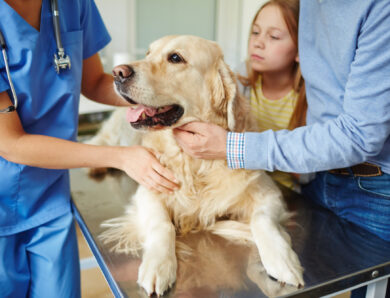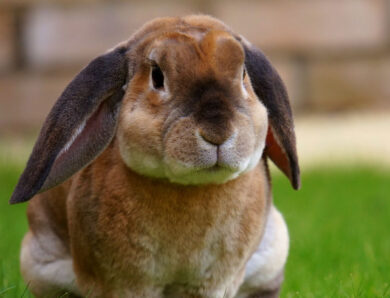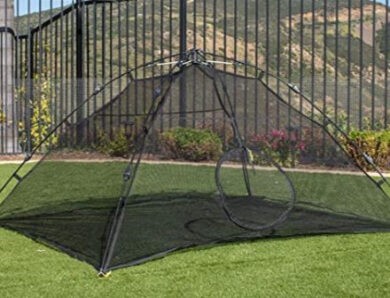
Are Guinea Pigs Good Pets?
Guinea pigs are adorable – tubby little ovals of fur with soft eyes and almost no tail. But cute looks aside, are guinea pigs good pets?
Too often considered “starter” pets, we believe guinea pigs deserve better because GP love is genuinely rewarded. Sensitive creatures, they’re aware of their surroundings and capable of bonding with their human caregivers, even squealing when they hear their people’s voices.
With proper care, guinea pigs can live five to eight years, enhancing our lives with their presence. Add to that the fact that these cute little cavies* require less daily care and vet attention than their canine and feline counterparts, and you’ve already got several reasons why guinea pigs are good pets.
(*Guinea pigs are neither pigs nor from New Guinea or Guyana, as originally thought. They are actually cavies, although the term guinea pig has stuck. But, if you’re looking for a breeder, “cavy” is your search term.)
But they do have specific healthcare needs and aren’t right for everybody.
So, are guinea pigs good pets?
Ultimately, that depends on you.
Here are some things to consider before adding a guinea pig (or cavy) to your family.
Guinea Pigs and Kids
Are guinea pigs good pets for kids? It’s not uncommon for families to bring home a guinea pig for their kids. Particularly if they don’t have room for a dog or a cat.
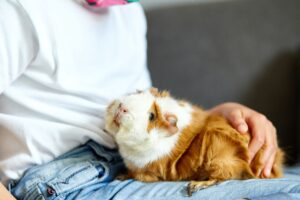
But guinea pigs and kids aren’t always a match made in heaven.
Yes, get a guinea pig or two if your child is regularly supervised by an adult, and you (or another adult) pledges to take on the lion’s share of the care.
But don’t just get a guinea pig because you think this is a way to teach your children to be responsible on their own.
“Parents make the mistake of giving their children the full responsibility of caring for the guinea pigs, but more often than not, children become bored and do not properly care for them,” Lisa Winn, animal manager/co-founder of the Ladybird Animal Sanctuary in Ontario, Canada tells Keeping It Pawsome.
Ladybird helps rehome cats, dogs, rabbits, and dozens of guinea pigs per year. “Many guinea pigs are surrendered to shelters or given away because the ‘children aren’t looking after them,'” Winn says. “Caring for pets should not be left solely in the hands of children.”
One reason not to get a guinea pig if you’ve got small children?
Guinea pigs have delicate skeletons and often don’t survive being dropped. Always lift a guinea pig carefully from underneath with your fingers around the front legs. Use the other hand to support the back end and feet. Hold them close to your chest, so they feel secure. Unsupported feet will kick, and keep in mind, most guinea pigs don’t like to be picked up.
On the other hand, guinea pigs are great pets for responsible teenagers and young adults — yes adults — especially those in apartments or condos that prohibit cats and dogs. Guinea pigs are caged, mostly, but they do require daily interaction and some exercise outside the cage.
“Most pet store cages are far too small,” Winn from Ladybird states. “We recommend C&C [cubes and coroplast] cages that you can make yourself for a much lower cost than store-bought cages.”
With proper care and regular handling, guinea pigs can bond with their people and even look forward to their cuddles and company. Yet another reason why guinea pigs are good pets.
Happier in Pairs
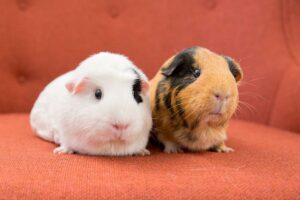
Thinking about adding a guinea pig to your family but not sure you’ll be able to interact with it every day? Consider getting more two, preferable two females. Guinea pigs are prey animals, so they are skittish and like safety in numbers.
“Guinea pigs need company and should never live without a cage mate,” Winn advises.
Males can live together too, but might be more territorial.
Note: Guinea pigs are hard to sex, meaning it’s challenging to tell if a guinea pig is male (boar) or female (sows). Simply turning them over and looking isn’t enough – though that’s what’s often done in pet stores. Male genitals are tucked inside and need to be gently pushed out (by someone who knows what they are doing) to be seen. Consider buying from a reputable breeder rather than a pet store to ensure you’re getting the right sex guinea pig(s).
Fixing guinea pigs is possible but problematic because they are very difficult to “put under” safely during surgery. Seek out a veterinarian that specializes in exotic animals.
“Most vet clinics do not treat guinea pigs,” Winn says, “And it can be difficult to find a clinic who can properly treat them when a medical issue comes up.”
Thinking a rabbit might be a better option? Here are the best pet rabbit breeds for first-time owners.
Guinea Pig Nutrition, Feeding & Exercise
Guinea pigs are herbivores and can digest only plant material. But caring for their nutrition isn’t as easy as throwing a bunch of lettuce in their cage and walking away.
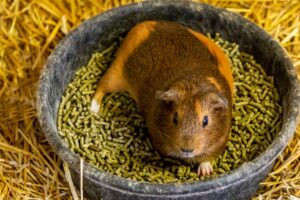
In a way, cavies have a lot in common with horses: they need constant access to quality Timothy hay (preferable to alfalfa) from hay feeders attached to the cage, and a bowl of specially formulated hard pellets because they have to chew.
Guinea pigs need to chew. Their teeth grow constantly and must be worn down continually or serious life-threatening health issues can arise. Access to untreated chemical-free wood blocks should work, but you may also need to bring them into the vet for special trimming.
Unlike horses (and other rodents), guinea pigs can get scurvy and need vitamin C regularly.
Guinea pigs also need fresh greens such as cabbage, kale, and romaine lettuce and fruits including blueberries, strawberries and even bananas. Some people add vitamin C supplements to the water, but this requires careful measuring.
A water bottle with a metal ball at the end (not plastic) is a good source of water but should be changed almost daily. Heavy food dishes from pet stores that are tip and chew-proof are also good. Remember, guinea pigs chew everything.
When it comes to exercise, guinea pigs do require time outside their cages to run around. Without adequate exercise, they’re more likely to gain weight, which can lead to long-term health issues. Some owners allow their guinea pigs to run free for an hour per day in a restricted space such as a kitchen or bathroom (although they will pee and poop).
Do not use exercise balls for guinea pigs. Exercise balls will damage their back and don’t have the air circulation they need.
Guinea Pigs and Other Pets
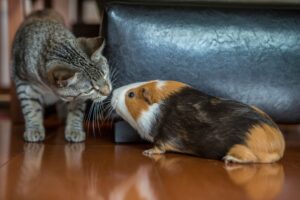
Considering that guinea pigs do require attention from you and time outside the cage, you’ll need to keep in mind how other pets in the house might react.
Dogs with a strong prey drive like terriers won’t make good companions. Cats, however, often don’t react because of the guinea pigs’ size, which ranges from 1.5 to 3 pounds.
Guinea Pigs and Vet Care
Guinea pigs do require some regular vet attention, although not as much as dogs and cats. But guinea pigs are considered exotics or pocket pets and not all veterinary hospitals deal with them. Look for clinics that have vets who specialize in exotics.
Are Guinea Pigs Good Pets?
In the right home providing exercise space, attention and quality food and care, we say yes! Guinea pigs can be rewarding companions for years … no fenced-in yard required!
